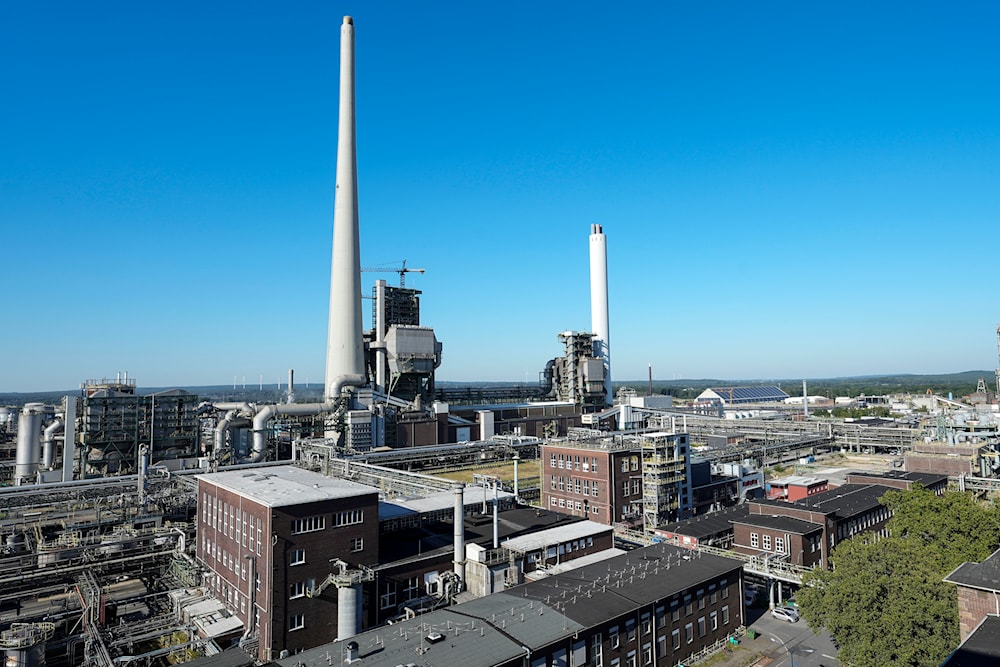Germany's deindustrialization closer than ever after Russia boycott
15% of German companies, the highest in Europe, are in distress and have weak balance sheets.
-

A coal-fired power station of German specialty chemicals company Evonik Industries is in operation at the Marl Chemical Park in Marl, Germany, Thursday, Sept. 7, 2023 (AP)
As German manufacturers have been struggling to maintain cost-competitive products, the loss of cheap Russian natural gas due to the war in Ukraine has served as a "final blow" for Germany. The country's reign as an industrial superpower seems to be “coming to an end," Bloomberg News announced yesterday.
Most Russian imports were boycotted in 2022 as a "punishment", which pushed Germany's already declining industrial output since 2017 further down the line. Bloomberg announced that century-old factories are closing and other companies are moving production lines to more cost-friendly countries, Bloomberg said.
CEOs, Chiefs, and government officials are concerned
CEO at GEA Group AG, machinery producer, Stefan Kelbert, stated, “There’s not a lot of hope if I’m honest,” adding, with concern, “I am really uncertain that we can halt this trend. Many things would have to change very quickly.”
The Federation of German Industries previously released a survey last September revealing that the top reasons for shifting investment abroad are concerns over energy security and energy costs.
BASF SE, Europe’s biggest chemical producer, and Lanxess AG are letting go of thousands of employees as chemical makers were among the manufacturers affected the most by the boycotting of Russian gas. French tiremaker Michelin and US rival Goodyear are also closing or downsizing their German plants.
Regional Chief of Michelin Maria Rottger informed Bloomberg that this is due to the extremely high costs explaining that "despite the motivation of our employees, we have arrived at a point where we can’t export truck tires from Germany at competitive prices. If Germany can’t export competitively in the international context, the country loses one of its biggest strengths."
German Finance Minister Christian Lindner stated at a Bloomberg conference earlier this month, “We are no longer competitive,” adding, “We are getting poorer because we have no growth. We are falling behind,” highlighting the severity of the crisis.
Russia, China, and a careless government
Russian President Vladimir Putin stated in December that Western nations are “playing the fool” by standing against Russia in an attempt for its fall as this only hurts their own people, rather than benefiting them through economic cooperation. He stressed that German leaders are "foolishly hurting" their own economy under US pressure and "silently accepting the bombings of the Nord Stream pipelines," which he believes the CIA is behind.
The German economy shrank in last year’s fourth quarter as a study by consulting firm Alvarez & Marsal showed that 15% of German companies, the highest in Europe, are in “distress” having weak balance sheets. The firm added that this rate was 9% last year.
Bloomberg said German manufacturers listed the country's deterring infrastructure, aging workforce, bureaucratic red tape, worsening education system, and increased competition from China as other reasons leading to their demise.
Foreign Trade Chief at the German Chambers of Commerce and Industry, Volker Treir, said, “You don’t have to be a pessimist to say that what we’re doing at the moment won’t be enough,” adding, “The speed of structural change is dizzying.”

 3 Min Read
3 Min Read








